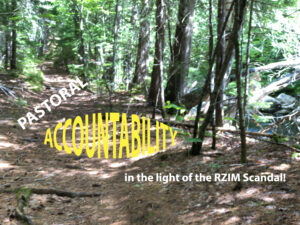
PASTORAL ACCOUNTABILITY IN THE LIGHT OF THE RZIM SCANDAL
THE CULT OF PERSONALITY
What happens on the macro scale (RZIM) also happens on the micro scale (local churches). Local church pastors can become big fish in small ponds, revered and appreciated so much that they grow beyond accountability in their ministries. We pay lip service to accountability but do not set up adequate structures to protect the church. Paul wrote:
Do not receive an accusation against an elder except on the basis of two or three witnesses. Those who continue in sin, rebuke in the presence of all, so that the rest also will be fearful of sinning. (1 Tim. 5:19-20)
A HEALTHY ACCOUNTABILITY SYSTEM
The governing board should be independent, transparent, and empowered to implement disciplinary decisions.
The pastor must willingly submit to the board’s authority to establish and implement accountability systems.
The leadership team, including the pastor(s), should develop a regular review process that all agree to follow in establishing an effective accountability system.
The governing board should establish guard rails for the pastor(s) that they review annually to keep them current. The guard rails should include matters of private life and financial decisions, not just church activities. The board should pay attention to the sins we tend to excuse, like pride, greed, deception, belittling others, unloving attitudes, and a domineering or controlling spirit. These sins act like warning lights on the ministry dashboard. Any concerns should be openly addressed on a regular basis. There are numerous tools for pastoral reviews available to churches today, including, if necessary, organizations that perform outside evaluations.
The board should carefully investigate accusations without seeking to discredit the accuser or protect the pastor presumptively.
One of the most common tendencies in a local church is to respond to any criticism of the pastor as an attack on the ministry. Churches naturally rally behind a pastor they love and discredit the critic without examining the issue. Accusers should be taken seriously and accusations investigated thoroughly. False accusations should be firmly but lovingly corrected. However, the board should not use silencers like “Look at all the good he is doing” or “souls will be lost” to try to dismiss the accuser. Attempts to discredit the critic by pointing out his/her flaws distract from a thoughtful investigation.
A healthy system of accountability protects both the pastor and the ministry from a shipwreck. We pastors should not fear honest accountability because we should want to be examples of integrity before the church (1 Peter 5:1-4). It is the leaders’ responsibility, including the pastor, to guard ourselves because in guarding ourselves, we guard the church (Acts 20:28). God is glorified in us when we lead with integrity because we demonstrate Christlikeness to the world.
[1] David French, “’You Are One Step Away from Complete and Total Insanity:’ The inside story of how Ravi Zacharias’s ministry concealed and enabled his abuse,” The French Press, 2/14/2021. Daniel Silliman and Kate Shellnutt, “Ravi Zacharias Hid Hundreds of Pictures of Women, Abuse During Massages, and a Rape Allegation,” Christianity Today, 2/11/2021.
[2] Richard Quebedeaux, By What Authority: The Rise of Personality Cults in American Christianity, Harper & Row, 1982.
[3] David Christensen, The Persuasive Preacher: Pastoral Influence in a Marketing World, Wipf & Stock, 2020.


